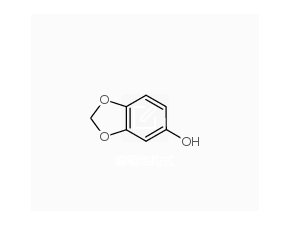
Sesamol
CAS No. 533-31-3
Sesamol( —— )
Catalog No. M18752 CAS No. 533-31-3
Sesamol could decrease lung inflammation and lipopolysaccharide (LPS)-induced lung injury in rats.
Purity : >98% (HPLC)
 COA
COA
 Datasheet
Datasheet
 HNMR
HNMR
 HPLC
HPLC
 MSDS
MSDS
 Handing Instructions
Handing Instructions
| Size | Price / USD | Stock | Quantity |
| 500MG | 26 | In Stock |


|
| 1G | Get Quote | In Stock |


|
Biological Information
-
Product NameSesamol
-
NoteResearch use only, not for human use.
-
Brief DescriptionSesamol could decrease lung inflammation and lipopolysaccharide (LPS)-induced lung injury in rats.
-
DescriptionSesamol could decrease lung inflammation and lipopolysaccharide (LPS)-induced lung injury in rats. Sesamol ameliorates inflammatory and oxidative damage by upregulating AMPK activation and Nrf2 signaling and blocking the NF-κB and MAPK signaling pathways and inhibits melanin biosynthesis by down-regulating tyrosinase activity and melanin production via regulation of gene expression of melanogenesis-related proteins through modulation of MITF activity, which promotes phosphorylation of p38 and JNK in melan-a cells.
-
In VitroSesamol has also been shown to be a classical inhibitor of lipid peroxidation. Sesamol (0-1 mM) efficiently induces the apoptosis of human liver hepatocellular carcinoma (HepG2) cells. Sesamol suppresses cell proliferation and induces intrinsic and extrinsic apoptosis in HepG2 cells. Sesamol treatment elicites mitochondrial dysfunction by inducing a loss of mitochondrial membrane potential. Sesamol inhibits mitophagy and autophagy through impeding the PI3K Class III/Belin-1 pathway. Sesamol decreases the expression of anti-apoptotic protein Bcl-2, but shows no effect on the expression of apoptotic signal Bax. Sesamol improves the protein expression of Fas/FasL, and activates tBid and caspase-8 which are all involved in the extrinsic apoptosis pathway.
-
In VivoSesamol treatment for 35 days does not significantly impact body weight, although the tumor volume is dramatically inhibited (40.56% size inhibitory rate with Sesamol at 200?mg/kg compared to the control group). However, a lower dose (100?mg/kg Sesamol) only has significant anti-tumor growth effect up to 27 days after the first treatment. The Bcl-2/Bax ratio in tumor tissues is also decreased. Moreover, in the Sesamol treatment group, levels of the cell proliferation marker Ki76 are down-regulated, and levels of the cell apoptosis marker cleaved-caspase 3 are increased when compared to control. The expression of LC3 protein is remarkably decreased by Sesamol in a dose-dependent manner.
-
Synonyms——
-
PathwayOthers
-
TargetOther Targets
-
RecptorAMPK
-
Research AreaInflammation/Immunology
-
Indication——
Chemical Information
-
CAS Number533-31-3
-
Formula Weight138.12
-
Molecular FormulaC7H6O3
-
Purity>98% (HPLC)
-
SolubilityIn Vitro:?DMSO : ≥ 100 mg/mL (724.01 mM)
-
SMILESC1Oc2c(O1)cc(cc2)O
-
Chemical Name——
Shipping & Storage Information
-
Storage(-20℃)
-
ShippingWith Ice Pack
-
Stability≥ 2 years
Reference
1. Wu XL, et al. Inflamm Res. 2015 Aug;64(8):577-88.
molnova catalog



related products
-
Henricine
Henricine is a natural product of Schisandra, Schisandraceae. Henricine can be used as a reference standard.
-
Oxyquinoline sulfate
Oxyquinoline sulfate is an antiseptic with mild fungistatic bacteriostatic anthelmintic and amebicidal action.
-
Chamaejasmenin B
Chamaejasmenin B is a compound isolated from Stellera chamaejasme L. Chamaejasmenin B has anticancer and antitumor activity, inhibiting cancer cell migration and invasion, and inhibiting tumor metastasis.Chamaejasmenin B is used in the study of cancers such as breast cancer.



 Cart
Cart
 sales@molnova.com
sales@molnova.com


